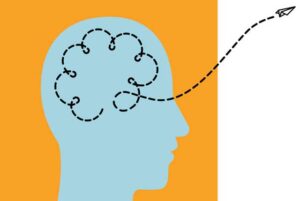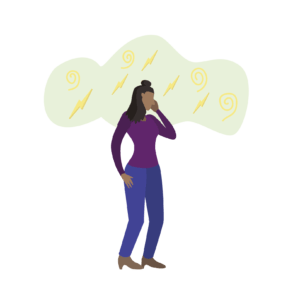When you hear the term “comorbid ADHD,” you might automatically think of two disorders that occur together. However, comorbidity doesn’t always mean that two disorders are occurring at the same time. Comorbidity can also refer to the situation in which a person has multiple disorders. This is often the case with ADHD, as it is commonly accompanied by other conditions like anxiety or depression. If you’re struggling with comorbid ADHD, don’t worry – there is help available! In this blog post, we will discuss how to address multiple disorders and get your life back on track.
Contents
What Is Comorbid ADHD?
 Comorbid ADHD is basically having more than one disorder at the same time. In this case, it would be ADHD and another mental health disorder. It’s pretty common for people with ADHD to have other disorders as well. This is why it’s important to get a comprehensive evaluation from a qualified professional.
Comorbid ADHD is basically having more than one disorder at the same time. In this case, it would be ADHD and another mental health disorder. It’s pretty common for people with ADHD to have other disorders as well. This is why it’s important to get a comprehensive evaluation from a qualified professional.
Moreover, comorbid is described as two disorders occurring at the same time. So, a person could have ADHD and anxiety or ADHD and depression. It’s important to note that one disorder doesn’t cause the other. However, having multiple disorders can complicate treatment.
In simple words, it is quoted as notable that ADHD occurs with another mental health disorder. It is not easy to live with any type of mental illness let alone two or more. So, it is important to seek professional help if you think you might have comorbid ADHD.
What Are The Signs Of Comorbid ADHD?
There are a few key signs that may indicate that someone has comorbid ADHD. These include:
- Trouble concentrating or focusing on one task
- Easily distractibility
- Problems with organization
- Hyperactivity or restlessness
- Impulsivity
- Difficulty completing tasks
- Problems with time management
- Low frustration tolerance
- Poor social skills
More often, the symptoms are not as clear-cut as they are in classic ADHD. And, because there are overlapping symptoms with other disorders, it can be difficult to make an accurate diagnosis.
However, it is believed that comorbid ADHD is underdiagnosed. This is likely because the symptoms are often attributed to the other disorders, rather than being recognized as a separate conditions. That’s why it’s so important to consult with a mental health professional who is experienced in diagnosing and treating comorbidity conditions.
How To Differentiate Comorbid ADHD Symptoms From ADHD?
 People often ask how to differentiate comorbid ADHD symptoms from “pure” ADHD. The answer is both simple and complicated. In short, it depends on the individual child’s or adult’s profile of strengths and weaknesses.
People often ask how to differentiate comorbid ADHD symptoms from “pure” ADHD. The answer is both simple and complicated. In short, it depends on the individual child’s or adult’s profile of strengths and weaknesses.
However, there are some general patterns that tend to emerge.
First, individuals with comorbid ADHD often have more severe symptoms of ADHD than those without comorbidity. They may also have more difficulty with activities of daily living and experience greater impairment in social, academic, and occupational functioning.
Second, individuals with comorbid ADHD tend to have higher rates of oppositional defiant disorder (ODD) and conduct disorder (CD). They may also be more likely to have anxiety and depression.
Third, individuals with comorbid ADHD often have difficulty with executive functioning skills. This means they may have trouble with planning, organization, time management, and task completion.
Fourth, individuals with comorbid ADHD often have a higher rate of learning disabilities (LDs). They may also have difficulties with reading, writing, and mathematics. Also, higher rate of sensory processing disorder (SPD). They are believed to be more sensitive to noise, touch, and light.
So, these are some of the general patterns that tend to emerge in comorbid ADHD. If you suspect your child or loved one has comorbid ADHD, it is important to seek out a comprehensive evaluation by a qualified mental health professional.
Other Conditions With ADHD
 There are a few other conditions that tend to be comorbid with ADHD. These include:
There are a few other conditions that tend to be comorbid with ADHD. These include:
Anxiety disorders
With ADHD, this is often a case of the chicken or the egg. It’s not clear if anxiety disorders are caused by ADHD or vice versa. But, either way, they often occur together. Also, it is believed that ADHD and anxiety disorders share some of the same genetic risk factors.
Depression
This is another common comorbidity with ADHD. In fact, up to 50 percent of people with ADHD also have depression. Depression with ADHD is actually more common in adults than in children. More often, it is undiagnosed or undertreated in adults.
Bipolar disorder
This is a less common comorbidity, but it does occur. Bipolar disorder and ADHD share some similar symptoms, such as impulsivity. And, like with anxiety disorders, it’s not clear if one causes the other. Bipolar disorder is also more likely to be comorbid with ADHD if there is a family history of bipolar disorder.
Obsessive-compulsive disorder (OCD)
OCD is defined as having unwanted and intrusive thoughts (obsessions) that lead to repetitive behaviors (compulsions). It is not as common as the other disorders on this list, but it does occur with ADHD. Also, it is believed that OCD and ADHD share some of the same genetic risk factors.
Learning disabilities
ADHD often occurs alongside learning disabilities, such as dyslexia. If you have ADHD and think you might also have a learning disability, it’s important to get evaluated. A learning disability can make it even more difficult to succeed in school or at work. This occurs because ADHD and learning disabilities can both cause problems with executive functioning.
Tourette’s syndrome
 This is a condition that causes people to have tics. Tics are repetitive, involuntary movements or vocalizations. Tourette’s syndrome is relatively rare, occurring in about one percent of the population. But, it does occur more often in people with ADHD. It is estimated that about 20 percent of people with Tourette’s syndrome also have ADHD.
This is a condition that causes people to have tics. Tics are repetitive, involuntary movements or vocalizations. Tourette’s syndrome is relatively rare, occurring in about one percent of the population. But, it does occur more often in people with ADHD. It is estimated that about 20 percent of people with Tourette’s syndrome also have ADHD.
So, these are some common comorbidities with ADHD. If you have ADHD and think you might also have one of these conditions, it’s important to talk to your doctor. They can help you get the evaluation and treatment you need.
How It Is Diagnosed?
The diagnosis for ADHD is actually pretty simple. A clinician will ask about symptoms and rule out other potential causes. However, comorbid ADHD complicates the diagnosis because there are often overlapping symptoms. For example, both anxiety and depression can cause problems with focus and concentration.
The best way to ensure an accurate diagnosis is to see a specialist who has experience diagnosing and treating ADHD. They will choose the right methods, which might include rating scales and questionnaires, to get a clear picture of what’s going on.
Another method, called neuropsychological testing, can also be helpful. This provides information about how well someone is able to think, learn, and remember. It can help rule out other potential causes of symptoms, such as learning disabilities.
Once comorbid ADHD is diagnosed, the next step is determining which disorder should be treated first. Moreover, it’s important to create a treatment plan that targets both disorders.
How To Treat Comorbid ADHD?
 Although treating comorbid ADHD can be difficult, it is important to remember that with the right resources and support, comorbid ADHD is manageable. Here are a few treatment options to treat your comorbid ADHD:
Although treating comorbid ADHD can be difficult, it is important to remember that with the right resources and support, comorbid ADHD is manageable. Here are a few treatment options to treat your comorbid ADHD:
Psychotherapy
This is a great option to explore if you are struggling with the emotional symptoms that can come with ADHD. Psychotherapy can help you learn how to cope with your symptoms and develop healthy coping mechanisms. It is also known as “talk therapy” and can be done with a therapist in person or online. There are several types of therapy, these include:
- Cognitive Behavioral Therapy (CBT): This type of therapy helps you change negative thinking patterns and behaviors.
- Interpersonal Therapy (IPT): This type of therapy focuses on your relationships and how they are affected by your ADHD.
- Family Therapy: As the name suggests, this type of therapy involves your family in your treatment. It can help improve communication and relationships within your family.
Therapies can do magic if you are willing to open up and do the work. It has been shown to be very effective in treating ADHD. You can try Mantra Care for some great therapist options.
Support Groups
Another great option for treating comorbid ADHD is to join a support group. There are many different types of support groups, and each of them can offer a unique and valuable perspective. Some support groups are made up of people who have similar disorders. While others are made up of family members and friends of those with ADHD.
Whatever type of support group you choose, make sure that it is one that you feel comfortable with. Also, it is important to remember that you are not alone in this. Many people have comorbid ADHD, and there are many resources available to help you manage it.
Medication
Medication is considered in most cases of ADHD. Many people with comorbid ADHD take more than one medication to help control their symptoms. This is because each disorder can cause different symptoms that may need to be treated separately.
In some cases, one medication may be able to treat both disorders. However, this is not always the case and each person should speak with their doctor to determine the best course of treatment. Some of the common medications include:
- Stimulants
- Non-stimulants
- Antidepressants
- Anti-anxiety medications
- Sleep medications
Each person will respond differently to medication and it may take some trial and error to find the right combination of medications. It is important to work with a professional who is familiar with comorbid ADHD.
Helpful Tips To Manage The Condition
 It is important to get a diagnosis from a qualified professional to ensure that it is in fact comorbid ADHD. Once you have received a formal diagnosis, there are things that can be done to help manage the condition. Here are some helpful tips:
It is important to get a diagnosis from a qualified professional to ensure that it is in fact comorbid ADHD. Once you have received a formal diagnosis, there are things that can be done to help manage the condition. Here are some helpful tips:
Accurate diagnosis
Comorbid ADHD is often misdiagnosed. It is important to seek out a professional who specializes in ADHD and can accurately diagnose the disorder. Because this is a complex disorder, it is important to rule out other possible conditions that may be causing symptoms. An accurate diagnosis can further lead to an effective treatment plan.
Create a support network
This condition is best managed with the help of a support network. This can include family, friends, and professionals who can offer guidance and assistance. It is important to have people you can rely on for help and understanding. In fact, support from your loved ones can be vital in managing comorbid ADHD.
Educate yourself about comorbid ADHD
It is important to learn as much as you can about the disorder. This includes understanding symptoms, treatment options, and how to manage the condition on a day-to-day basis. It is also crucial to educate your loved ones about the disorder. This way, they can be more understanding and supportive.
Create a routine
Routine is important for managing comorbid ADHD. Having set times for activities and sticking to a schedule can help minimize symptoms and improve functioning. This can be difficult at times, but it is important to stick with it as much as possible. also, people with comorbid ADHD often benefit from having a visual schedule to help them keep track of what needs to be done.
Find a therapist you trust
When it comes to therapy, it is important to find a therapist you trust. This is someone who will understand your unique situation and can offer guidance and support. Therapists can also help develop coping mechanisms for dealing with the challenges of comorbid ADHD. There are several types of therapy that can be effective, so it is important to find one that best suits your needs.
Monitor symptoms and progress
It is important to regularly monitor your symptoms and progress. This can help you identify triggers and patterns. It can also help you see how well your current treatment plan is working. If you are not seeing the results you want, don’t be afraid to reach out to your support network or therapist for help.
Practice healthy mechanisms
 Healthy coping mechanisms are important for managing comorbid ADHD. This can include things like:
Healthy coping mechanisms are important for managing comorbid ADHD. This can include things like:
- exercise,
- keep a journal,
- healthy eating,
- meditation,
- spend time in nature,
- deep breathing exercises.
These activities can help you manage symptoms and improve your overall well-being. In fact, research has shown that exercise can be especially beneficial for people with comorbid ADHD.
Stay calm and positive
Although comorbid ADHD can be difficult to manage, it is important to stay calm and positive. This condition is manageable with the right resources and support. Remember, you are not alone in this journey. There are people who care about you and want to help you find success. Seek out their support and stay positive throughout your journey.
So, there are a few things to keep in mind when it comes to comorbid ADHD. With the right resources and support, this condition can be managed. Remember to stay calm and positive throughout your journey.
Conclusion
In conclusion, comorbid ADHD is a complex issue that requires careful diagnosis and treatment. There is no one-size-fits-all approach to managing comorbid ADHD, but understanding the unique needs of each individual with comorbidity is essential to developing an effective plan. With proper diagnosis and treatment, individuals with comorbid ADHD can lead happy and successful lives.
For more information, please contact MantraCare. ADHD is a neurodevelopmental disorder characterized by difficulty in paying attention, hyperactivity, and impulsivity. If you have any queries regarding Online ADHD Counseling experienced therapists at MantraCare can help: Book a trial ADHD therapy session


